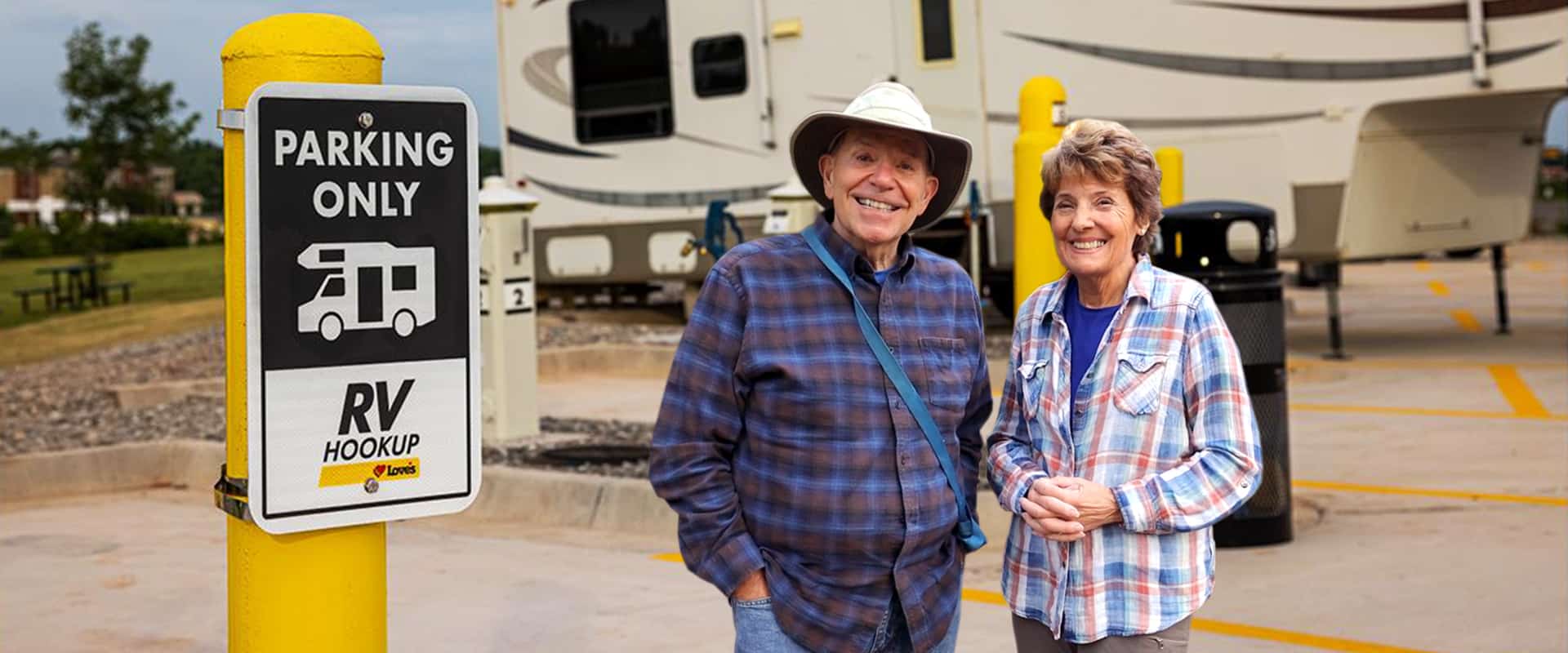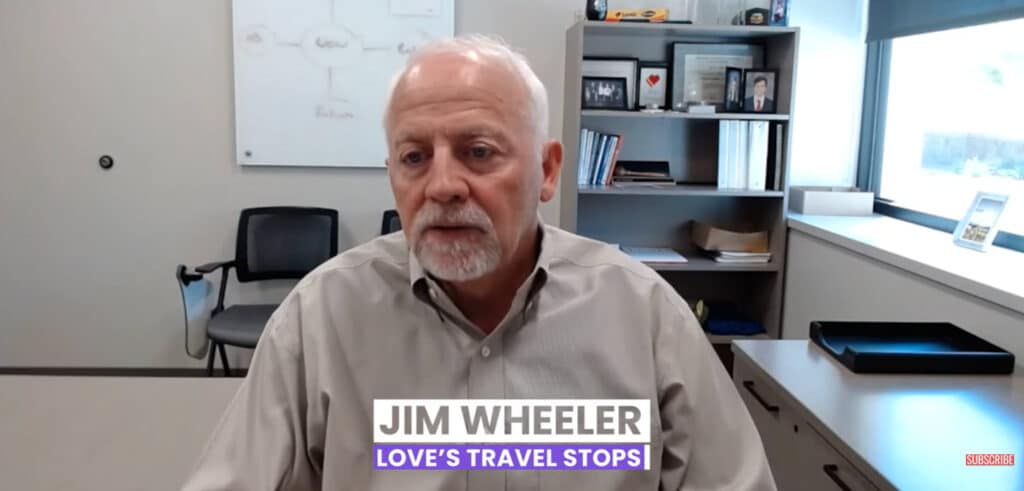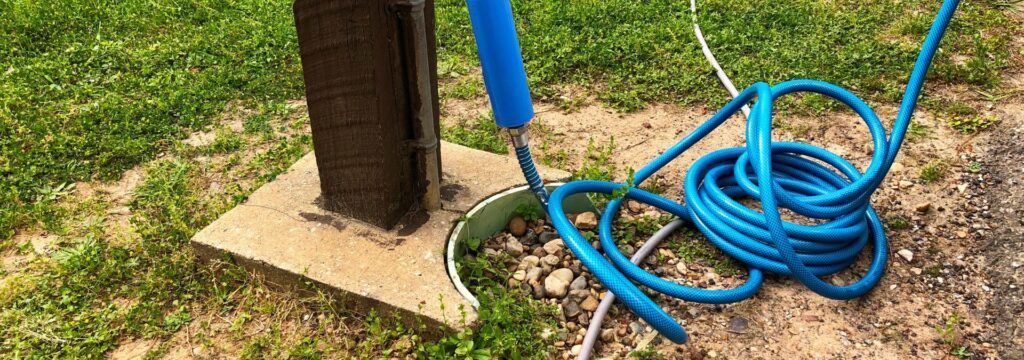RV Podcast #537: Truck Stop Camping

This week on Episode 537 of the RV Podcast:
- Why truck stop camping should be in your overnight travel plans this year
- Your RV's Pre-Season Checklist – the things that must be replaced at the start of a new camping season
- The Trump administration’s continuing budget cutting and the dwindling workforce may result in reduced hours and early closures for our National Parks.
- And in Mike & Jen’s Storytime, The Rooster's Revenge, or Why Bo Doesn't Chase Chickens Anymore
To see the YouTube video version of the podcast, click below:
For the audio version, download on your favorite podcast app or click the player below:
Podcast: Play in new window | Download (Duration: 46:38 — 27.3MB) | Embed
Subscribe: Spotify | TuneIn | RSS
RV CONVERSATION OF THE WEEK -Truck Stop Camping

By popular request, we bring back a conversation we had last spring with Jim Wheeler, director of hospitality of Loves Travel Spots. Since then, Loves has greatly increased the number of RV camping spots at almost 90 locations around the country, totaling over 1,400 individual camping spots.
They are adding 17 more locations this year.
The company clearly sees an opportunity to bring in more RVers and is offering full hookups and lots more.
As you plan your spring and summer travels, this interview may convince you that a truck stop may now be in your overnight plans.
SOCIAL MEDIA BUZZ – Wendy Bowyer

Wendy Bowyer reports on the hot issues most talked about this past week on social media and our RV Lifestyle Community group.
Over in our private RVLifestyle Community, it is now officially March Meetup month! You've heard of March Madness; well, in our community, it is March Meetup time! We have volunteer hosts organizing get-togethers all around the country, inviting others to join them for a meal to connect! Some are meeting at restaurants, others a winery, another a Cracker Barrel and one even at someone's home. Locations so far include Tennessee, southwest Michigan, North Carolina, and the Florida panhandle. It is going to be so much fun!
Then over in our RVLifestyle Facebook Group, the interesting conversations continue. Janice wrote: What are your thoughts of staying overnight at a rest area?
This post had more than 400 responses with some people saying don't do it because it is not safe – and many of these “don't do it” folks seemed very adamant.
But by far, the majority of the folks said DO IT and they, too, were very adamant and had some great tips.
First know the local law – make sure it is legal to do this. Second, know the location – is it generally safe? Leon was one of many who said to listen to your gut and if you have a bad feeling, don't stay.
Christy reads reviews on the rest stop on some apps she has before deciding to overnight. But overall she said she prefers them to a Walmart parking lot because most have security cameras and feel safer. In fact many said they felt safer at a rest area, saying the number of truck drivers around added a level of safety.
Another Facebook post that caught my eye was from Dwight who asked:
Does anyone tow with full fresh water tanks? Pros and Cons please.
More than 300 comments left on this post. What was interesting about this was the responses seemed evenly split between those who always travel with a full water tank, and those who never do.
For those who always travel with a full water tank, some said they do this for stability, others want to be prepared for anything.
Grace was of this later line of thinking and wrote: We always make sure it is full before getting on the road. Then you have water on the road for flushing toilets, washing hands and consumption. Further you are covered if any problem arises. We once checked into a campground that was on a boil water alert for a full week. We have also encountered water line repairs that had campground water shut down 24-48 hours. With our full tank we never had a problem.
But for those who were against traveling with a full water tank, the issue came down to weight. Water is heavy – weighing about 8.34 pounds per gallon.
This can mess up your gas mileage, your trailer weight or even your RV safety. Jay is one of many concerned about this and wrote: A full tank is a LOT of weight pulling on the tank hangers EVERY time you hit a bump, increasing the probability of tank damage or dropping the tank all together. It is EASY to fill your tank upon arrival at a park at the Dump Station.
So interesting to read – and certainly lots of pros and cons for Dwight to consider.
Have Fun. Make Friends. Find Adventure.

Ready to enhance your RV adventures?
Connect with fellow travelers who share your passion for life on the road through rallies, campground gatherings, and RV clubs where you can exchange stories and discover hidden gems at RVCommunity.com
Our private online community offers endless possibilities for exploration and meaningful connections—all without the drama often found on social media platforms. Think of it as a virtual gated campground with warm, welcoming friends all around you, ready to offer help, tips, ideas, and great campfire conversations.
Please join us! You'll find supportive friends who understand the unique joys and challenges of RV living while creating unforgettable memories together on your journeys. Click RVComminity.com for more info.
RV NEWS OF THE WEEK

If your spring travel plans include visiting a national park, you might want to call ahead to see if the park you're visiting is affected by staffing cuts. Last week the public learned an additional 700 full time National Park Service employees are taking the Trump Administration's early buy out. Add in the previous staff cut and the delay in hiring seasonal employees and reports are starting to surface of reduced park and visitor center hours, long lines to get in and more.
Camping World Holdings, Inc. closed on purchasing two more Lazydays – one in Murfreesboro, Tennessee and another in Vancouver, Washington. The company also announced the public can expect more purchases in the weeks ahead.
California State Parks announced this spring's wildflower bloom in Southern California is expected to be limited because of below average winter rainfall. Texas, another location RVers often flock to see spring wildflower blooms, is predicting a mixed forecast because of drought, with the best wildflower displays in the eastern part of the state.
Matador Network and The Dyrt worked together to release a list of 60 of the prettiest places to camp, broken down into six regions across the US. Because it is always fun to check out lists like this, here is a link to see if you agree with their ranking.
Kentucky's Kenlake State Resort Park will be closed during the 2025 season. The park is undergoing $9.3 million in renovations and campground improvements and is expected to reopen in March 2026.
RV QUESTION OF THE WEEK

QUESTION: This is our second RV season coming up and we know there are some things we should replace or restock on for the new travels. We plan to be gone this time from May through October. What are your suggestions? – Doug
ANSWER: Since we don't know what kind of RV you have or what is new and what isn’t, we’ll just answer by telling you the items we replace every year. We've put links in the description below.
New Water Hoses – We get two new ones every year, a 50 footer and a 25 footer. It’s inevitable that they will not totally dry out between uses, and then bacteria, mold, or algae will develop. And during storage, any moisture left in the hose can lead to bacteria, algae, and biofilm development, which can contaminate your fresh water system. Older hoses can also impart a plastic or rubber taste to your drinking water.
New water filters – We get three water filters each year. We put a new one in to start the year and then replace it around August. The third one may or may not be used, depending on where we camp and the quality of the water. Filters trap sediment, dirt, and debris from the tap. As these build up, the filter gets clogged, slowing water flow and reducing pressure to your RV’s system. A clogged filter won’t catch new contaminants effectively, either. And, as with water hoses, stagnant, damp conditions inside a used filter being stored between uses encourage microbial growth, potentially making your water less safe than if you’d skipped the filter altogether.
Toilet chemicals and treatments – These chemicals can lose effectiveness over time, especially if they are opened or exposed to temperature fluctuations in storage. The active ingredients that break down waste and control odors may become less potent. Many toilet treatments contain enzymes or bacteria that have a limited shelf life. After a year, these biological components may no longer be viable or as effective at breaking down waste.
Air conditioner filters – Throughout a season of camping, filters collect dust, pollen, dirt, and other airborne particles. Even with regular cleaning, some residue remains embedded in the filter material. A filter with a season's worth of accumulated debris restricts airflow, forcing your AC unit to work harder, using more energy and potentially shortening its lifespan. During storage months, any moisture trapped in the filter can promote mold and mildew growth, which will then circulate through your RV when you turn on the AC.
Kitchen sponges and dishcloths – During storage between seasons, even clean sponges and dishcloths can harbor bacteria and mold in their damp fibers. When stored in a closed-up RV environment, these microorganisms can multiply. The cleaning products, grease, and food particles from the previous season cause the materials to break down over time, making them less effective at cleaning. Besides that, deteriorated cleaning tools are more likely to spread rather than remove bacteria, potentially causing foodborne illness during your trips.
Quick Links:
- RV Cleaning and Maintenance
- RV Kitchen Supplies – Jennifer’s Favorites
- Outside the RV – Camping Essentials
- Inside the RV – Home, Bath, and Storage
Mike & Jens Storytime: The Rooster's Revenge

In our travels across North America, we frequently encounter free-range chickens. From the quaint streets of Key West to rustic Harvest Host farms, these feathered friends can be found strutting about, pecking at the ground, and generally going about their chicken business with a certain dignified nonchalance.
Our Norwegian Elkhound, Bo, is quite the vigilant guardian. Deer, turkeys, sandhill cranes, raccoons, and especially those “arch-nemesis” squirrels – all flee before his mighty bark and impressive chase. Yet curiously, whenever chickens wandered onto our property from our Michigan neighbors' yard, Bo seemed to develop a sudden case of chicken blindness. He'd carry on as if these poultry trespassers were completely invisible, even when they practically brushed against his fur.
This puzzling behavior remained a mystery until we chatted with the neighbor boy whose family raised the chickens.
“Oh, Bo used to chase our chickens something fierce,” the boy explained with a knowing smile. “Until that day when Roosevelt took matters into his own wings.”
Roosevelt, as it turned out, was the flock's rooster – and apparently, a tactical genius. After enduring Bo's harassment, Roosevelt had finally had enough. One fateful day, when Bo came charging toward the flock, Roosevelt did the unthinkable – he charged right back.
In a move worthy of an avian action hero, Roosevelt leapt onto Bo's back and began furiously pecking at his tail. Poor Bo, completely unprepared for this counterattack, found himself transformed from fearsome predator to panicked victim in seconds.
Somehow, Bo managed to shake off his feathered assailant, but the damage to his dignity was done. From that day forward, a silent treaty existed between Bo and the chicken flock. The birds could wander wherever they pleased, and Bo would suddenly find something very interesting to look at in the opposite direction.
The moral of the story? Sometimes the smallest opponent teaches the biggest lessons. Or perhaps more precisely: Respect isn't given freely – sometimes it must be pecked right into you.

Get the Home Study Course today and worry about the road, not the repairs!
Every time you move your RV it's like driving through a hurricane during an earthquake. Parts break and many items need to be maintained, this program will show you how you can save time and money by gaining the confidence to take on the majority of the issues you’ll come across. Don’t get caught with your RV in the shop! Learn how you can maintain and repair your RV at your own pace and at the most convenient time for you! This course is produced by the National RV Training Academy.
